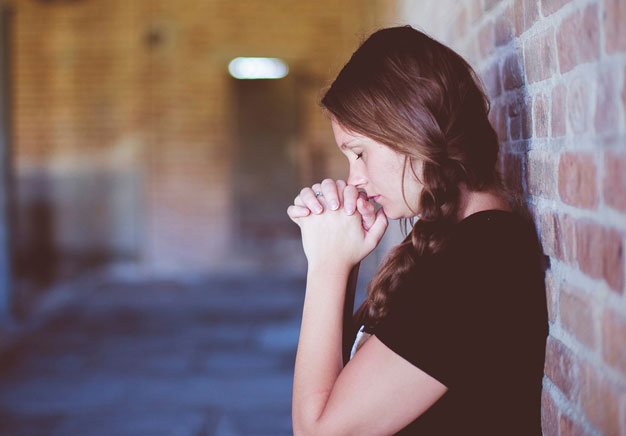
A young woman spends time in prayer in this stock image. Prayer is among the things people can do to cope with stress and anxiety. Experts say the COVID-19 pandemic has impacted the mental health of many.
“For I know well the plans I have in mind for you says the Lord, plans for your welfare, not for woe! Plans to give you a future full of hope” Jeremiah 29:11.
By Barb Arland-Fye
The Catholic Messenger
BETTENDORF — Mental health is a topic that “touches all of us in some form,” says Dr. Henry Emerle, a psychiatrist who shared ideas for coping with stress and anxiety during a recent presentation at St. John Vianney Parish.
The parish’s Social Justice Committee invited Emerle to speak Sept. 9 because the COVID-19 pandemic “has had a major effect on our lives, including impacting the mental health of many.” His presentation addressed the typical mental health issues people are experiencing in this unsettling time and how to help others suffering from mental health issues that may require treatment and medication.
Anxious, stressed out, worried, fearful, low, lonely, overwhelmed, helpless and frustrated are some of the mental health issues people are dealing with because of the pandemic, said Emerle, who practices adult and geriatric psychiatry at Vera French Community Mental Health in Davenport.
Anxiety involves physical and mental components that become evident in unhelpful thinking patterns; the mind fixates on stress. “We have the power in our mind to change those threats,” he said.
Effective coping skills include breathing exercises, mindfulness, relaxation, meditation, an “unplugging” vacation (from social media) and good sleep hygiene. “Everything takes work,” he said. “The desire to work has to be there.”
Breathing from the belly, for example, helps alleviate anxiety; breathing from the chest does the opposite. He invited participants to breathe in from the nose for four counts, hold for two counts and exhale from the mouth for six counts to experience the calming effect.
Mindfulness involves being present in the moment and being fully aware of where you are and what you are doing. Practice loving kindness on yourself. Praying the rosary or another favorite form of prayer is also a way to practice mindfulness.
He encouraged participants to challenge “catastrophic” thinking. When you jump to the worst-case scenario, challenge it with facts from reliable news sources. Read, listen to or watch uplifting news, or take a news fast. Hypothetical worry is another stressor to challenge with reliable information and advice. Focus instead on what is important to you, your routine and the things you do to relax. Cultivate connections with others, eat well, exercise, seek and offer support to others. Focus on what you can control.
Emerle introduced the THINK method to control anxious thoughts: “T” for “Is it true?” “H” for “Is it helpful?” “I” for “Is it inspiring?” “N” for “Is it necessary?” “K” for “Is it kind?” He offered a suggestion about worrying that prompted some chuckles: “Delay worrying, set aside a time to worry.” Distract yourself.
COVID has “isolated us. It has affected our seniors, children and families,” he said, speaking from personal experience as a husband and father of five young children in addition to maintaining a psychiatric practice. “Kids think everything in the world is their fault. Sometimes it’s good to hear that it’s not their fault.”
His employer, Vera French Community Mental Health, offers same-day access for adults and children (visit the website at verafrenchmhc.org/ for information).
Two other speakers shared insights about mental health. Christina McNamara-Schmidt, development manager for NAMI Greater Mississippi Valley, spoke about NAMI and its role in supporting individuals living with mental health conditions and their families and the annual walk that funds that mission (namigmv.org). Margie Scott-Craig, a parishioner of St. John Vianney, shared her family’s story of living with loved ones with mental illness and the death of her son by suicide. She and her husband, Kirk, appreciate NAMI-GMV for its programs.
Allison Ambrose, who leads the Social Justice Committee of St. John Vianney, assigned the audience some homework: choose to take an action from among a list of suggestions to address mental health. “We asked people to take one and just do it!”
The eight actions:
• Support NAMI — Sign up for the walk (The presentation happened before the walk, which was Sept. 18).
• Donate.
• Educate — Identify local resources focused on mental health to share with others (namigmv.org/local-mental-health-resources/).
• Pledge to speak out against the stigma of mental illness. Sign and take a pledge card as a reminder!
• Research/inform — Familiarize yourself with mental health issues such as access, equity, funding, prevention and workplace (mhanational.org/policy-issues).
• Write or call your legislators to express your thoughts on the need for legislation to support mental health.
• Be vocal about the need to raise the priority for mental health funding in Iowa (i.e., advocate for more mental health beds in Iowa and other significant priorities).
• Advocate — Write or call your legislators to express your thoughts on the need to raise the priority for mental health funding in Iowa.
Ambrose summed up her takeaways from the presentation: “Having mental health issues is perfectly normal and there are strategies to help when you feel anxieties, etc., coming on, but serious mental health issues need to be treated with therapy/meds. Also, NAMI is a great organization for those who have loved ones with mental health issues.”











